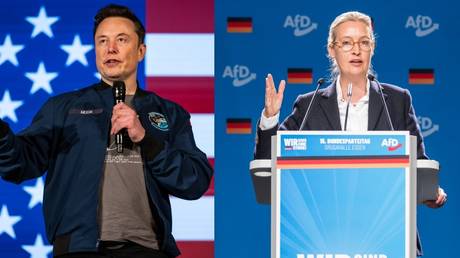ARTICLE AD BOX
Berlin’s Defense Ministry is fleeing Elon Musk’s platform claiming “factual exchange” is becoming difficult
The German Defense Ministry and the Bundeswehr have announced they will stop posting on X – formerly Twitter – claiming that Elon Musk’s platform makes it “difficult to have a factual exchange.”
Musk has lambasted the current German government for promoting the “woke mind virus” and leading the country to ruin, going so far as to endorse the Alternative for Germany (AfD) party and interview its leader Alice Weidel earlier this week.
“We will leave our X-channel dormant until further notice and will not post anything actively for the time being,” the Defense Ministry announced on Wednesday. “We have decided to take this step because a factual exchange is becoming increasingly difficult here.”
According to a statement posted on the ministry’s website, it will continue to communicate with the public via press releases, a WhatsApp group, YouTube, Instagram, and “other social media.” The Bundeswehr reserves the right to post on X “in the case of disinformation campaigns,” it said.
Read more Merkel ‘ruined’ Germany, Ukraine conflict, ‘Hitlerian’ censorship: Key points from Musk’s talk with AfD leader
Merkel ‘ruined’ Germany, Ukraine conflict, ‘Hitlerian’ censorship: Key points from Musk’s talk with AfD leader
The move comes after over 60 German universities and research institutes announced their departure from X, alleging “increasing radicalization” on the site. Two labor unions and the top federal court have also departed the platform in a huff.
Musk bought Twitter in October 2022, citing the previous management’s out-of-control censorship, and has since rebranded the platform as X. Proponents of “fact-checking” and censoring “disinformation” have tried to set up alternatives such as Threads and Bluesky, but failed to make an appreciable dent in X’s user base.
Chancellor Olaf Scholz will continue to use X “for the time being,” his spokesman told reporters in Berlin on Wednesday. “It's a difficult balance to strike,” the official representative said, describing X as “not without controversy.”
The “controversy” in question appears to be Musk’s endorsement of AfD and an interview with Weidel. He did the same last year to back Donald Trump’s presidential bid in the US, which saw him triumph in November.
The German establishment has long tarred AfD with accusations of “extremism,” but its popularity has surged in recent months due to its positions on immigration and the economy. Scholz’s “traffic light” coalition collapsed in November and Germans will have to vote for a new parliament in late February.
.png)
 3 hours ago
5
3 hours ago
5







 English (US)
English (US)